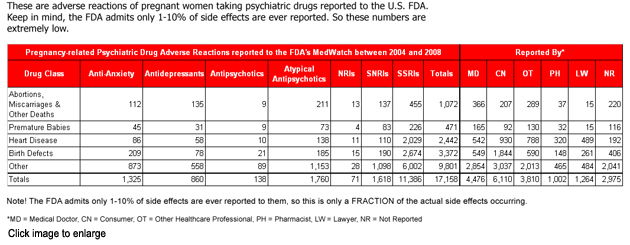by CCHR International
November 4, 2010
Medical News Today published an article entitled “Increased Depression Screening Needed During Pregnancy, Study Says,” that is so highly misleading, we wonder if they ever bother checking the validity of what they’re forwarding under the guise of “medical news.”
We’re going to make this really simple—the study and its findings are bogus not to mention highly misleading and we’re only going to take up the two most egregious “facts” of the article to make our point.
The article states, “The authors of the study say their findings suggest that screening for depression should be a routine part of prenatal and postnatal care. They conducted a 10-week pilot project at WIC clinics in Santa Fe and Las Vegas, N.M., finding that 109 of 467 women who were screened had a high enough score on the Edinburgh Postnatal Depression Scale to require a referral.”
FACT: The Edinburgh Postnatal Depression Scale—also called EPDS, is a screening method documented to triple the number of women diagnosed with Post partum depression, according to a study published in Obstecrics & Gynecology. The Scandinavian Journal of Public Health stated that EPDS screening was so unethical it should not be used.
So the authors are knowingly promoting a study which is known to triple the amount of women diagnosed postpartum depression, has been called so unethical it should not be used.
Next, the article states, “There are antidepressants that are safe to take during pregnancy”
False.
FACT: Four countries have done nine studies on the effects of antidepressants during pregnancy or breast feeding. They found that newer and older antidepressants can cause premature births, and increase the risk of cardiovascular interventions such as heart surgery in early childhood. In addition, newer antidepressants could also cause withdrawal symptoms, respiratory problems, and neurological problems.
Six counties have issued a total of 15 drug regulatory warnings on antidepressants causing severe problems for newborns.
They warn of:
- Newer antidepressants causing seizures,
- Wellbutrin, Cipralex, Luvox, Remeron, Effexor and Zyban increasing the risk of a life-threatening lung condition in newborns,
- Zoloft and Celexa causing withdrawal symptoms and increasing the risk of a life-threatening lung condition in newborns,
- Paxil and Prozac causing withdrawal symptoms and increasing the risk of cardiovascular birth defects and a life-threatening lung condition in newborns
Like we said, the article and the “findings” are highly misleading to say the least.
We’d also like to suggest something to any press forwarding these psycho/pharma puff pieces— Its called Google Search. Its pretty easy these days to check the facts before promoting bogus studies and or “findings” that are not only false, but can harm pregnant women and can give false information under the guise of “medical news.” We also recommend that anyone reporting on psychiatric drugs at least check our psychiatric drug database to see what international drug regulatory agencies and international studies have warned about these drugs instead of just regurgitating the latest pro drug study https://www.cchrint.org/psychdrugdangers/
Here is a very short video of what can happen to pregnant women when they are not given the facts about these drugs:
In Memory of Matthew Schultz / Effexor Baby Pregnancy Infant Death
http://www.youtube.com/watch?v=qnxuw2ufSug&p=7F22F2C419977E5A&playnext=1&index=70
And finally, the “Medical News” article:
Increased Depression Screening Needed During Pregnancy, Study Says
Medical News Today
Twenty-three percent of pregnant women screened at two Women, Infant and Children clinics in New Mexico met criteria for depression, according to a study by a work group of the New Mexico Health Department and state Human Services Department, the Albuquerque Journal reports.
Nationwide, 10% to 16% of pregnant women meet the criteria for depression, and 70% show some depressive symptoms, according to the American College of Obstetrics and Gynecologists. In June, ACOG said that screening of pregnant women for depression should be “strongly considered” but that there is not enough evidence to recommend it.
The authors of the new study say their findings suggest that screening for depression should be a routine part of prenatal and postnatal care. They conducted a 10-week pilot project at WIC clinics in Santa Fe and Las Vegas, N.M., finding that 109 of 467 women who were screened had a high enough score on the Edinburgh Postnatal Depression Scale to require a referral. The work group recommended increased training on depression screening tools for providers and more support groups for women, in both English and Spanish.
Signs of depression in pregnant women include feeling dread about the pregnancy, anxiety, isolation from loved ones, suicidal thoughts, self-harm, constant sadness, changes in appetite and lack of ability to experience pleasure, according to therapist Stefanie Luna. Doctors say leaving severe depression untreated could increase the risk for low birthweight or premature birth. When women are depressed they also are less likely to care for themselves and more likely to drink or smoke. There are antidepressants that are safe to take during pregnancy (Schoenberg, Albuquerque Journal, 11/1).



SHARE YOUR STORY/COMMENT